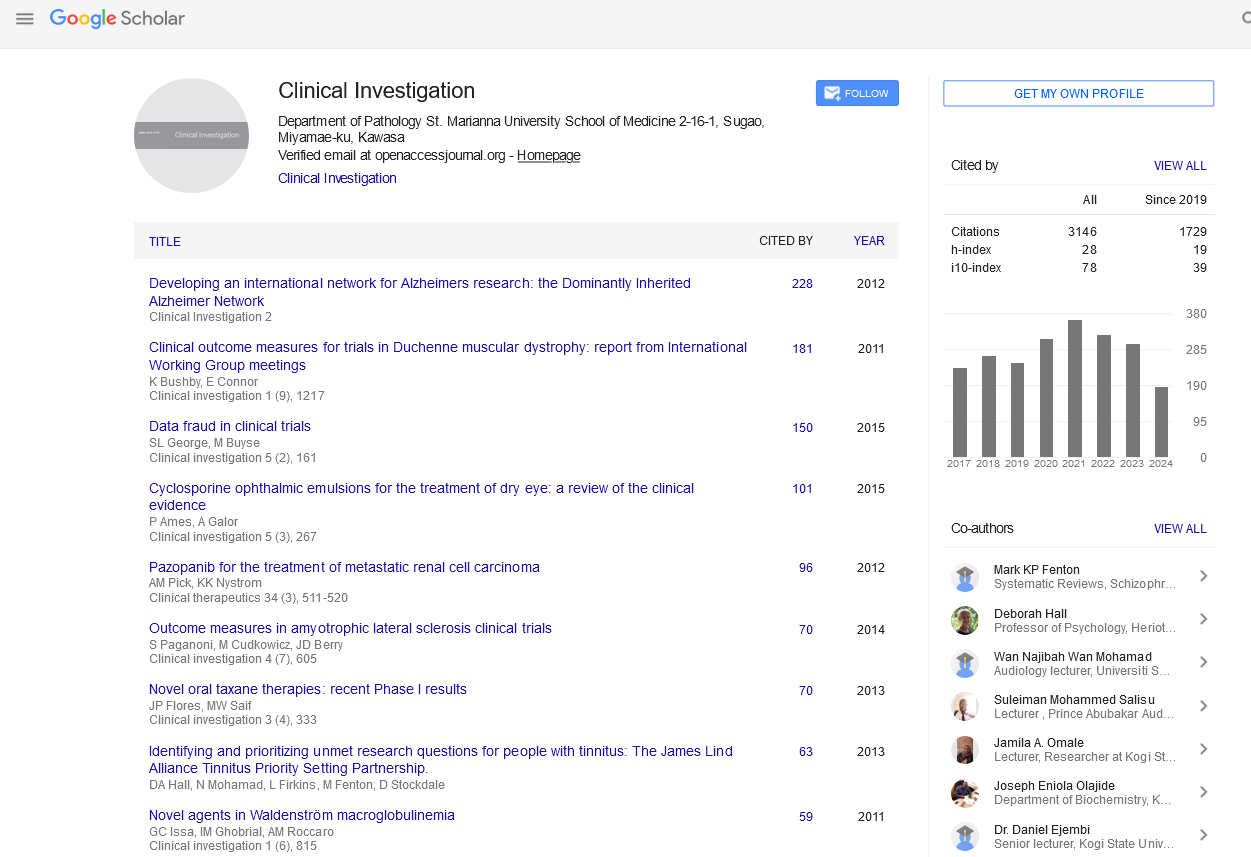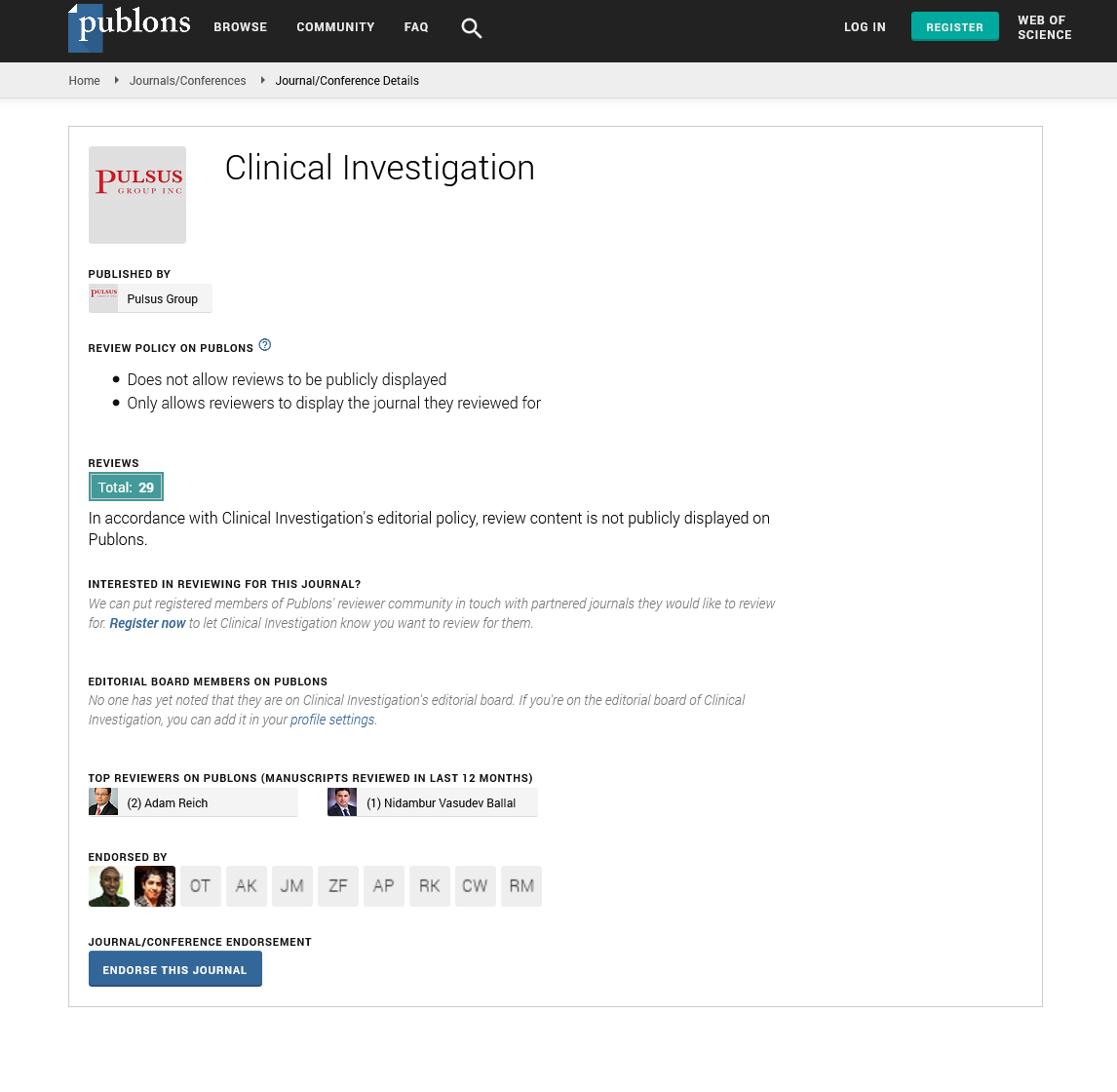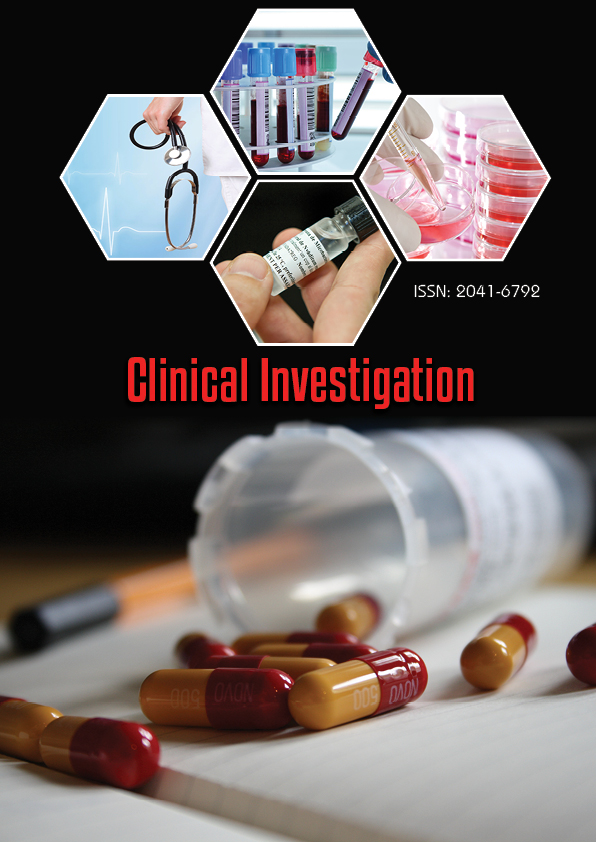Perspective - Clinical Investigation (2024) Volume 14, Issue 3
Impact of Metro Opening on the Health of Middle-Aged and Older Adults: Evidence from China
- Corresponding Author:
- Rasha Fasul
Faculty of Biology, University of Vienna, Austria
E-mail: rashafasul@gmail.com
Received: 2-Mar-2024, Manuscript No. fmci-25-160254; Editor assigned: 5-Mar-2024, PreQC No. fmci-25-160254 (PQ); Reviewed: 13-Mar-2024, QC No. fmci-25-160254(Q); Revised: 21-Mar-2024, Manuscript No. fmci-25-160254(R); Published: 26-Mar-2024
Abstract
Biomedical research plays a pivotal role in enhancing human health by offering insights into the mechanisms of diseases and facilitating the development of innovative treatments. This article provides an overview of key advancements in biomedical research, including genetic studies, personalized medicine, and novel drug therapies. It highlights the crucial role of interdisciplinary collaboration in accelerating medical breakthroughs and emphasizes the potential of emerging technologies, such as CRISPR and artificial intelligence, in shaping the future of healthcare. The article also discusses the ethical challenges and funding constraints that can impede progress in biomedical research. Finally, it underscores the importance of continued investment in research to tackle global health challenges.
Keywords
Biomedical research • Genetic studies • CRISPR • Drug development • Personalized medicine • Artificial intelligence • Healthcare • Ethics
Introduction
Biomedical research encompasses a wide range of scientific disciplines aimed at understanding the biology of human health and disease. Over the past few decades, this field has seen tremendous advancements, not only in understanding the underlying mechanisms of diseases but also in developing novel treatment strategies. From the discovery of the structure of DNA to the development of targeted therapies, biomedical research has revolutionized the way we approach healthcare.
The contributions of biomedical research have been vast, from eradicating smallpox to improving cancer survival rates. In recent years, the advent of new technologies, such as genome sequencing, CRISPR gene editing, and Artificial Intelligence (AI), has further accelerated the pace of discovery. These innovations hold the potential to significantly improve both the precision and effectiveness of medical interventions.
This article provides an overview of the critical developments in biomedical research, with a focus on genetic studies, personalized medicine, and drug development. Additionally, it discusses the role of emerging technologies in shaping the future of medicine and the challenges that need to be addressed for research to continue advancing.
Advancements in biomedical research
• Genetic research and genome sequencing: One of the most groundbreaking areas of biomedical research has been the study of genetics. The Human Genome Project, completed in 2003, marked a milestone by mapping the entire human genome. This project provided insights into how genetic variations influence susceptibility to various diseases and conditions, offering new opportunities for targeted treatments. More recent advances in genome sequencing technologies, such as Next-Generation Sequencing (NGS), have enabled scientists to analyze individual genomes more quickly and affordably. Personalized medicine, which tailors medical treatments based on an individual’s genetic makeup, is becoming increasingly prevalent. For instance, cancer treatments that target specific mutations are now being used to treat patients more effectively, reducing side effects compared to traditional therapies.
• CRISPR gene editing: The development of CRISPR-Cas9 technology has revolutionized genetic research by providing an efficient method for editing genes. CRISPR allows researchers to precisely alter DNA sequences, correcting genetic mutations that cause diseases. This technology has the potential to treat genetic disorders like cystic fibrosis, sickle cell anemia, and Duchenne muscular dystrophy. While still in the early stages, CRISPR-based therapies are moving through clinical trials, offering hope for previously untreatable conditions. However, ethical considerations regarding gene editing, especially germline editing (altering the DNA of embryos), remain a significant challenge for the scientific community.
• Personalized medicine and targeted therapies: Personalized medicine refers to tailoring medical treatment to the individual characteristics of each patient, including their genetic profile, environment, and lifestyle. This approach aims to optimize the efficacy of treatments and minimize adverse effects. It has already seen success in the treatment of certain cancers, where targeted therapies are designed to act on specific molecular changes within tumors. The field is also expanding into other areas, such as cardiovascular diseases and neurodegenerative disorders. However, challenges such as the high cost of genetic testing and the need for a robust infrastructure to support personalized care remain barriers to widespread adoption.
• Artificial intelligence in biomedical research: The use of Artificial Intelligence (AI) and machine learning has become increasingly important in biomedical research. AI algorithms can analyze vast amounts of biological data, identifying patterns and predicting outcomes that might be missed by human researchers. For example, AI has been instrumental in drug discovery by predicting how different molecules interact with target proteins, thus accelerating the development of new therapies. AI is also being used in diagnostics, where machine learning models can analyze medical images (e.g., MRI scans, X-rays) to detect diseases like cancer at an early stage. These technologies have the potential to reduce diagnostic errors and improve patient outcomes.
Ethical challenges and regulatory considerations
While the progress in biomedical research is promising, it comes with ethical dilemmas that must be carefully navigated. One of the primary concerns is the use of gene editing technologies like CRISPR, particularly in the context of germline editing. Editing the DNA of embryos or germ cells raises questions about the long-term consequences, potential for unintended genetic alterations, and the possibility of creating “designer babies.”
Additionally, the accessibility and affordability of personalized treatments and AI-driven healthcare solutions pose concerns. There is a risk that these advances could exacerbate existing healthcare disparities, particularly in low-income populations or developing countries.
Regulatory bodies, such as the U.S. Food and Drug Administration (FDA) and the European Medicines Agency (EMA), play a critical role in ensuring the safety and efficacy of new treatments. However, the rapid pace of scientific innovation means that regulatory frameworks must evolve to keep up with emerging technologies. Striking a balance between promoting innovation and ensuring patient safety remains a significant challenge.
One of the major obstacles in advancing biomedical research is the lack of sufficient funding. Research often requires significant investment in terms of time, resources, and expertise, yet the financial support available can be limited. This is particularly problematic in academia, where funding is often competitive and dependent on government grants or private partnerships.
Private-sector investment, while important, can sometimes be driven by financial motives, which may influence the direction of research. It is essential for governments and institutions to provide consistent and equitable funding to support basic and applied biomedical research. The challenges posed by funding constraints must be addressed to ensure that promising scientific advances are translated into tangible health improvements.
Conclusion
Biomedical research is at the forefront of transforming healthcare and improving human health. Through genetic research, personalized medicine, and groundbreaking technologies like CRISPR and artificial intelligence, scientists are making strides in understanding the molecular basis of diseases and developing innovative treatments. However, challenges related to ethics, funding, and regulation must be addressed to ensure that these advancements benefit society as a whole.
As biomedical research continues to evolve, collaboration among researchers, healthcare providers, policymakers, and the public will be critical to overcoming these challenges. Increased investment in scientific research, along with a focus on equity and ethics, will be essential in realizing the full potential of biomedical innovations and improving global health outcomes.


